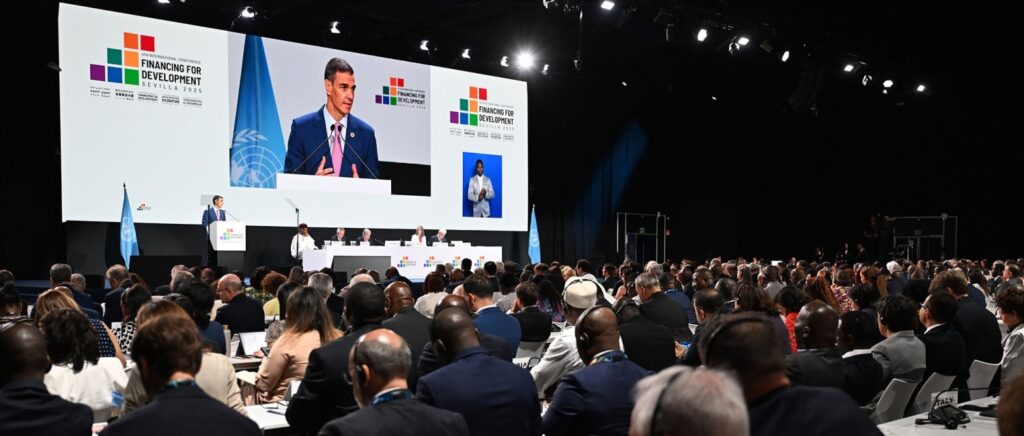- Representatives of the European Anti-Poverty and Social Exclusion Network in Spain (EAPN-ES) have participated in the opening of the IV International Conference on Financing for Development (FfD4) of the United Nations, which is being held until July 3 in Seville.
- The meeting will address fiscal reforms aimed at meeting the Sustainable Development Goals (SDGs) of the 2030 Agenda.
- Spain is far from the international poverty eradication goals: by 2024, 2.8 million people should have already been lifted out of the risk of poverty and/or social exclusion.

On Monday, June 30, the IV International Conference on Financing for Development (FfD4) of the UN began in Seville, a meeting that brings together political leaders, international organisations, financial institutions, companies, and civil society organisations with the aim of addressing the pending challenges in terms of financing and compliance with the Sustainable Development Goals (SDGs) of the 2030 Agenda.
The Conference was attended by Carlos Susías, President of EAPN-ES and EAPN Europe, and Juan Luis Delcán, President of EAPN Andalucía, representing the network and as part of the delegation formed by the Coordinating Committee of Organizations for Development (CONGD) and Futuro en Común. The grouping of civil society organisations has collected a series of proposals aimed at promoting a change of the development model focused on people, rights and the planet.
“The FfD4 represents a historic opportunity to close the financing gap of up to 4 trillion dollars a year that is needed to meet the 2030 Agenda,” they have pointed out in a document agreed by all organisations. In this sense, they add “it is essential that the commitments are translated into concrete actions, where global justice, gender equality, the fight against poverty and environmental protection are prioritized, rejecting fiscal policies that perpetuate inequality”.
The main proposals presented by CONGD and Futuro en Común are:
- Endorse a United Nations Framework Convention on International Tax Cooperation, to create a fairer global tax system, capable of curbing the tax evasion and avoidance that deprives countries of the global south of key resources for their development.
- Ensure progressive tax systems with a feminist and climate focus, taxing large fortunes and polluting corporations, with the aim of reducing inequalities and financing just ecological transitions.
- Review and transform the International Financial Institutions (IFIs) and Multilateral Development Banks, democratising their governance so that they prioritise human development and the protection of the planet over the interests of capital.
- Adopt a United Nations Treaty on Business and Human Rights, which would regulate in a binding manner the activities of transnational corporations to ensure respect for human rights and the environment in all value chains.
- Fulfil the commitment of 0.7% of Gross National Income as Official Development Assistance (ODA), allocating these funds effectively to eradicate poverty, reduce inequalities and guarantee rights, in addition to financing peace building and feminist policies.
- Adopt a Sovereign Debt Convention at the United Nations, to establish a multilateral debt crisis resolution mechanism that allows countries to allocate resources to social protection and SDGs compliance, rather than servicing unsustainable debts.
- Strengthen climate finance as new and additional ensuring that historical CO₂ emitting countries assume their responsibility through grants, not loans, thus avoiding increasing the debt of countries in the global south.
Far from Poverty Commitments
The eradication of poverty constitutes SDG 1 of the United Nations, a goal that involves reducing by at least half the proportion of men, women and children of all ages living in poverty in all its dimensions, and to which successive governments have committed themselves within the framework of the 2030 Agenda.
To achieve this goal, our country should reduce the at-risk-of-poverty and/or social exclusion rate to 14.3%, which is equivalent to lifting more than 5 million people out of this situation in 15 years. However, according to the XV Report ‘The State of Poverty’ published on June 4 by EAPN-ES, only a third of that decline has been achieved: in 2024, 2.8 million people should have already left the risk of poverty and/or social exclusion.
EAPN-ES, together with other civil society organisations that make up the CONGD and Futuro en Común, call on governments and the international community to take advantage of the FfD4 in Seville to build a new global financing framework that puts human rights, social justice, a feminist approach and the protection of the planet at the center, ensuring that no one is left behind.
Photographs: Pool Moncloa /Borja Puig de la Bellacasa. Palacio de Congresos y Exposiciones (FIBES), Seville.
